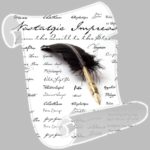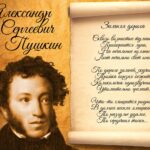Александр Пушкин «Зима. Что делать нам в деревне?..» на английском языке
***
Зима. Что делать нам в деревне? Я встречаю
Слугу, несущего мне утром чашку чаю,
Вопросами: тепло ль? утихла ли метель?
Пороша есть иль нет? и можно ли постель
Покинуть для седла, иль лучше до обеда
Возиться с старыми журналами соседа?
Пороша. Мы встаем, и тотчас на коня,
И рысью по полю при первом свете дня;
Арапники в руках, собаки вслед за нами;
Глядим на бледный снег прилежными глазами;
Кружимся, рыскаем и поздней уж порой,
Двух зайцев протравив, являемся домой.
Куда как весело! Вот вечер: вьюга воет;
Свеча темно горит; стесняясь, сердце ноет;
По капле, медленно глотаю скуки яд.
Читать хочу; глаза над буквами скользят,
А мысли далеко… Я книгу закрываю;
Беру перо, сижу; насильно вырываю
У музы дремлющей несвязные слова.
Ко звуку звук нейдет… Теряю все права
Над рифмой, над моей прислужницею странной:
Стих вяло тянется, холодный и туманный.
Усталый, с лирою я прекращаю спор,
Иду в гостиную; там слышу разговор
О близких выборах, о сахарном заводе;
Хозяйка хмурится в подобие погоде,
Стальными спицами проворно шевеля,
Иль про червонного гадает короля.
Тоска! Так день за днем идет в уединенье!
Но если под вечер в печальное селенье,
Когда за шашками сижу я в уголке,
Приедет издали в кибитке иль возке
Нежданная семья: старушка, две девицы
(Две белокурые, две стройные сестрицы), —
Как оживляется глухая сторона!
Как жизнь, о боже мой, становится полна!
Сначала косвенно-внимательные взоры,
Потом слов несколько, потом и разговоры,
А там и дружный смех, и песни вечерком,
И вальсы резвые, и шепот за столом,
И взоры томные, и ветреные речи,
На узкой лестнице замедленные встречи;
И дева в сумерки выходит на крыльцо:
Открыты шея, грудь, и вьюга ей в лицо!
Но бури севера не вредны русской розе.
Как жарко поцелуй пылает на морозе!
Как дева русская свежа в пыли снегов!
1829
Александр Пушкин (1799–1937)
* * *
It’s wintertime and cold. A long day is before me.
The servant brings my tea. «How is the weather — stormy
Or has the blizzard stilled?» I ask him. «And the snow —
Right for the hunt, I hope? If not, then tell me sol!..
Now, is it bed or saddle?.. Wait, I know what’s coming:
You’ll tell me I’m to sit indoors till dinner, thumbing
Through these outdated sheets… No? Then-to horse!» — And we
With dawn’s first light are off across the empty lea.
We’re holding riding crops, our hounds the horses follow;
Our eyes are on the ground, each drift, each snowy hollow
We patiently inspect, then, circling, scour the grove,
And, two hares bagged, ride home… The hour is late, by Jove!..
Now night crawls up… What cheer!.. The wind howls. On the table
A lonely candle smokes. The heart aches, is unable
To cast off sudden gloom… Of boredom drop by drop
The baneful brew I drink… At random picking up
A book, I scan a page… My thoughts are far, and, closing
The volume, for a pen I listless search… She’s dozing,
My Muse is, and from her I can but force a few
Inane and dismal words, a shapeless phrase or two…
My wayward servant Rhyme ignores my goading… Dull are
The lines that slowly form, cold, nebulous, of colour
Bereft… The lyre is mute… By our long match worn out,
I join the rest downstairs… What is the talk about?..
Of course! The sugar mill, and the elections, whether
They’ll soon be held or not… As sulky as the weather
Our hostess is, she frowns the while her needles fly,
Or at the King of Hearts stares with a doubtful eye.
Was ever man so bored! The days run on unending,
In weary solitude… But should, when I am spending
Over a game of draughts an hour or sometimes more,
My neighbour’s covered sleigh at dusk stop at my door
And bring three welcome guests: two sisters and their mother —
The girls are fair and slight and very like each other —
Then bubbling, sparkling life, I willingly confess,
Comes to my lone retreat, my distant wilderness!..
At first a casual look, then, one less cool, less guarded,
Then some few words exchanged, then, all reserve discarded,
Long conversations, laughter, songs by candlelight,
Games, dancing, talk with questions that invite
Hushed, meaningful replies and coy and languid glances,
And, on a narrow staircase, murmured confidences…
Night’s coming to the porch a young maid brings. She stands
There shyly, bosom bare… The storm fine snowflakes sends
Into her face. But see the northern winds hard-blowing
Can do the Russian rose no harm: her cheeks are glowing,
On her lips kisses flame; fresh stays she mid the snows!
Alexander Pushkin
Translated by I. Zheleznova
* * *
Here’s winter. Far from town, what shall we do? I question
The servant bringing in my morning cup of tea:
«How is the weather warm? Not storming? The ground’s covered
With freshly fallen snow?» Come, is it best to be
Astride a horse at once, or shall we, until dinner,
See what the neighbor’s old reviews may have to say?
The snow is fresh and fine. We rise, and mount our horses,
And trot through fields agleam with the first light of day.
We carry whips; the dogs run close behind our stirrups;
With careful eyes we search the snow, we scour the plain
For tracks, ride round and round, and tardily at twilight,
After we’ve missed two hares, at last turn home again.
How jolly! Evening comes: without, the storm is howling;
The candlelight is dim. The heart is wrenched with pain.
Slow drop by drop I drink my boredom’s bitter poison.
I try a book. The eyes glide down the page — in vain:
My thoughts are far away . . . and so I close the volume,
Sit down, take up my pen, force my dull Muse to say
Some incoherent words, but harmony is wanting,
The sounds won’t chime . . . The devil! Where now is my sway
Over the rhyme? I can’t control this curious handmaid:
The verse is shapeless, cold, so lame it cannot walk.
So I dismiss the Muse: I am too tired to quarrel.
I go into the parlor where I hear them talk
About the sugar-works, about the next election;
The hostess, like the weather, frowns, her only arts
Are plying rapidly her long steel knitting needles,
Or telling people’s fortunes by the king of hearts.
What boredom! Thus the days go by, alike and lonely.
But if, while I play draughts at twilight in my nook,
Into our dreary village a closed sleigh or carriage
Should just by chance bring guests for whom I did not look:
Say, an old woman and two girls, her two young daughters
(Tall, fair-haired creatures, both), the place that was so dull,
So Godforsaken, all at once is bright and lively,
And suddenly, good heavens, life grows rich and full!
Attentive sidelong looks by a few words are followed,
There’s talk, then friendly laughter, and songs when lamps are lit,
And after giddy waltzes there come languid glances,
There’s whispering at table, gay and ready wit;
Upon the narrow stairs a lingering encounter;
When twilight falls, a girl steals from her wonted place
And out onto the porch, bare-throated, chest uncovered
The wind is up, the snow blows straight into her face!
But never mind! Our fair is heedless of the snowstorm.
Unhurt in northern blasts the Russian rose will blow.
How hotly burns a kiss in keen and frosty weather!
How fresh a Russian girl abloom in gusts of snow!
Alexander Pushkin
Translated by Babette Deutsch






Комментарии
Александр Пушкин «Зима. Что делать нам в деревне?..» на английском языке — Комментариев нет
HTML tags allowed in your comment: <a href="" title=""> <abbr title=""> <acronym title=""> <b> <blockquote cite=""> <cite> <code> <del datetime=""> <em> <i> <q cite=""> <s> <strike> <strong>